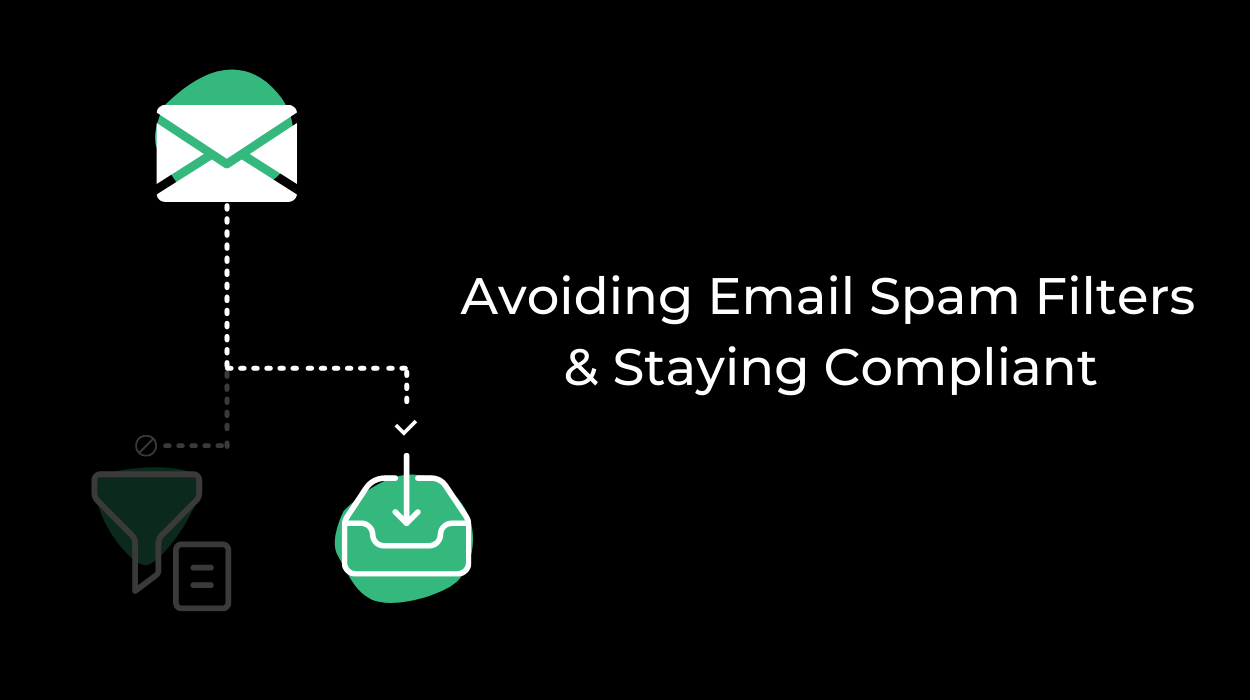Despite the growing popularity of social media and the rapid development of various marketing solutions, email marketing remains even more relevant even today. Recent data shows that email is among the top 3 choices for B2B and B2C marketers and is considered one of the most reliable methods for distributing content and nurturing leads.
However, email marketing still has to deal with avoiding spam filters. According to Statista, spam emails account for nearly half (47.3%) of email traffic globally—and your carefully crafted email marketing campaign could be one of them.
How do you avoid email spam filters? In what ways could your email be considered spam?
What Is spam and how is it detected?
Spam, in the context of marketing, is unsolicited messages that are sent to recipients in bulk. As such, spam emails are also known as Unsolicited Bulk Email (UBE).
Spam messages are detected by spam filters. These filters work by sifting each email and putting them up against a list of criteria to determine whether it’s spam or not. If it’s considered spam, it will go straight to your Spam or Junk folder.
Another way spam messages are discovered are through email firewalls. They function the same way as spam filters, but the main difference is that if your email is flagged as spam and reported as such several times, your IP address and domain name will be communicated with other firewalls, blocking all incoming emails from you.
Spam Laws
Unintentionally creating and sending spam-like email marketing campaigns can be damaging to your reputation. Additionally, if your organization does not comply with spam laws, you could also face serious penalties, including civil and criminal charges.
Each country has different laws and policies in place for commercial emails; for example, the United States has CAN-SPAM and Canada has CASL. Here are the things you need to know about these two laws:
1. CAN-SPAM
CAN-SPAM is the short name for the United States’ Controlling the Assault of Non-Solicited Pornography And Marketing Act of 2003, which is enforced by the Federal Trade Commission (FTC). The Act aims to protect consumers from any unsolicited business emails, regardless if they were sent in bulk or not.
Additionally, not all B2B or B2C emails are considered part of the coverage of CAN-SPAM. Emails that are transactional in nature are exempted—for example, following up an ongoing transaction. For emails that have both commercial and transactional content, the primary purpose of the email will be the deciding factor
Penalties
CAN-SPAM has heavy penalties for non-compliance, amounting to $43,792 for each separate email in violation. And if there is more than one organization involved, all of them can be held responsible.
Additional fines might also be incurred if aggravated violations are also present in the case, as well as criminal penalties and imprisonment. Among these violations are any fraudulent ways to digitally access or use the information for commercial gain.
How to avoid violating CAN-SPAM Laws:
The FTC specified 7 main requirements for commercial emails:
- Keep your header information accurate: This applies to the information in your “From,” “To,” and “Reply to” fields, as well as the domain name and email address.
- Be honest with your subject lines: It must clearly and concisely describe the contents of your email.
- Be honest that the message is an ad: You must also be honest that your message is commercial in nature. It can be as simple as including a fine print that says, “This advertisement is brought to you by XYZ Corp.”
- Disclose your business location: You must include a valid, current, and accurate physical address of your business. PO boxes can also be used.
- Must include an opt-out notice: Provide a conspicuous notice in the email, clearly stating how recipients can opt-out of any future emails at any time. Opting out must also be easy and straightforward to do—for example, requiring only one or two clicks to do so.
- Honor opt-out requests within 10 business days: These requests must be promptly and unconditionally honored.
- Be sure that third-party email marketing tools/solutions you use are compliant: It is your legal responsibility to check and ensure that all aspects of CAN-SPAM are being followed.
2. CASL (Canada)
Canada’s Anti-Spam Legislation (CASL) regulates and outlines safe practices in email marketing to protect both businesses and individuals from spam and other digital threats.
CASL is reinforced by the Canadian Radio-television and Telecommunications Commission (CRTC), and it applies to commercial messages sent by Canadian and global organizations to Canadian recipients. As opposed to CAN-SPAM, CASL is a more recent law, created in 2014, and is considered as one of the toughest yet most effective laws concerning spam. What sets it apart from other laws is its stringent requirement for people to opt-in—that is, you must have consent from recipients before you can send commercial emails to them.
Penalties
Penalties under CASL are quite severe, consisting of fines up to $1 million for individual violators and up to a staggering $10 million for corporations. This amount applies to each violation.
In addition to the heavy fines, victims can sue for damages if actual harm or loss after receiving the spam message is proven. Organizations are also subject to vicarious liability for any wrongful acts done by the company itself, its employees, or any third parties they work with in relation to email marketing.
How to avoid violating CASL Laws:
To summarize, CASL requires organizations sending commercial messages the following:
- Clear identifying information about their business is provided in the message, including the company name, current physical address, and contact information.
- Express and implied consent are knowingly given by the customers before organizations can send them commercial messages. Records of the consent must also be kept (i.e., date, location, and manner).
- Express consent refers to recipients saying yes to email opt-ins. It also includes any verbal or written consent to receive emails from the company. There is no expiration for this type of consent but it can be revoked by the recipient at any time.
- Implied consent refers to certain activities with the customer that imply being in agreement with the company to receive emails. CASL stipulates that the validity for implied consent for a purchase is 2 years; consent for an inquiry, 6 months. Once the consent expires, the contact information of the recipient must be removed from the mailing list.
- All messages must have a clear and straightforward unsubscribe option. All opt-out requests must also be honored within 10 business days.
Spam filters and how to avoid them
While every spam filter, email firewall, and spam law are different from one another, there are certain widely accepted best practices in sending commercial emails. Here are a few tips on how to avoid having your email flagged by spam filters:
1. Boost IP Address Reputation and Sender Score
The reputation of your IP address is one of the factors in determining whether your email is safe or not. Email providers use your Sender Score (also known as IP reputation, IP score, or email sender reputation) to gauge if your email should be filtered to the spam folder or sent to your inbox.
If your IP address is new, consider IP Warming:
Mailbox providers view emails from a new IP address as suspicious until they establish a positive sending reputation, which can take between 4-8 weeks. Warming could take longer if email providers perceive the email as “unwanted” by the recipient. This is why Alpine IQ recommends starting with your best-performing messages or campaigns to your highest engaged audience. The goal during the warm-up process is to send to your subscribers who are least likely to bounce or complain. During your IP warm-up, the more consistent you are with volume, frequency, complaint, and bounce levels, the faster you will establish a positive sending reputation.
IP Warm-up Plan:
- Weeks 1 & 2:
Send frequently to your most active subscribers – those who have opened/clicked, or opted-in within the past 30 days - Weeks 3 & 4:
Expand to subscribers who have opened/clicked, or opted-in within the past 60 days - Weeks 5 & 6:
Expand to subscribers who have opened/clicked, or opted-in within the past 90 days
A few other factors that could also affect your Sender Score are the following:
- Having a high hard bounce rate, which refers to failed email deliveries, such as the recipient’s email address being invalid or incorrectly spelled.
Pro Tip: To avoid hard bounces, make sure you are cleaning your lists often. There are email verify softwares availble that can bulk verify. - Using purchased email lists and thus giving you low recipient engagement and more spam complaints.
- Sending poor-quality content.
2. Ensure all metadata is accurate
Metadata in emails is the information in the Date, From, To, and Subject of your email.
Spam filters are more likely to flag your email if it’s addressed to your recipient’s email address and not their name. Alpine IQ recommends that you use our macros to personalize the “To:” field of your email. Also, spam filters will check if your recipients already know you. This is why it is important to use a verified domain to send your messages.
Having misleading metadata or thumbnails in your email could lead to your message being filtered as spam. Additionally, any misleading information that’s intended to trick users into believing the content to be something else is against both CAN-SPAM and CASL laws.
3. Remove excess code
The code behind the email templates you use must be kept simple and clean. Having a messy code, including broken or incomplete tags, could prompt spam filters to flag your email.
4. Tailor your content to boost engagement
We briefly mentioned earlier that recipient engagement is a factor in determining Sender Score. A practical tactic to boost engagement is to segment your subscribers and then tailor your email content to their interests, needs, and preferences. In a study, it has been found that 72% of consumers prefer to engage with personalized messages over generic ones.
5. Provide quality email content
The quality of the content constitutes the majority of the factors in determining whether an email is spam. Here are some tips to avoid being flagged by spam filters:
- URLs: Use descriptive text instead of naked URLs as the link text. Avoid using URL shorteners as well.
- Links: Make sure all links included in your email are working properly.
- Images and text: Balance the ratio of images to text and links to texts. Be also sure that images are mobile-responsive and are optimized for web viewing.
- Grammar and spelling: Emails with poor grammar and spelling errors could make it appear unprofessional, and recipients may likely report your email as spam.
- Trigger words: Avoid spam trigger words and, as mentioned earlier, make sure that your subject lines are accurate and honest. There’s an exhaustive list of trigger words (nearly a thousand!), but here are a few to give you an idea:
- Calls to action that denote a sense of urgency: Act now / hurry / open this
- Competitions: Congratulations / you’re a winner!
- E-commerce: Order today / wants credit card
- Financial: Double your income / earn extra cash
- Health: Lose weight / life insurance / Viagra
- Marketing: Dear friend / 100% free / free sample
- Special offers: For you / instant access
- Sales: For only (amount) / join millions / save big
6. Properly format your email
Another factor is the formatting of your email. An unprofessionally formatted email does not only make your content look spammy, but it also affects your bounce rate and engagement. Avoid the following formatting mistakes as much as possible:
- Using all caps
- Using multiple punctuations (e.g., “Hello!!!!” or “What do you think?!?”)
- Using too many colors
- Using too many different font styles and/or font sizes
Professionally Craft Your Email Marketing Campaigns
A lot of effort goes into email marketing campaigns, and being mindful of whether you’re compliant with spam laws is just one of its many facets. One way to streamline your process is to work with professional marketing solutions providers like Alpine IQ.
All our solutions are backed by stringent security measures to make sure that your data and that of your clients’ are safe and secure. Our email marketing service, in particular, is equipped with the best tools to efficiently automate your email campaigns for you. We also ensure that every email you send is compliant with spam and data security laws.
To get the latest updates on our suite of services, make sure to subscribe to our blog today!






Leave a Comment